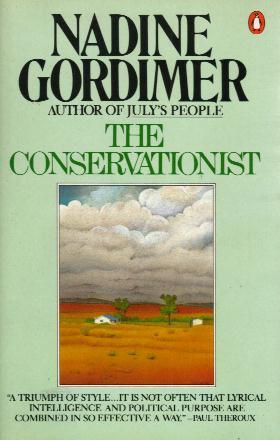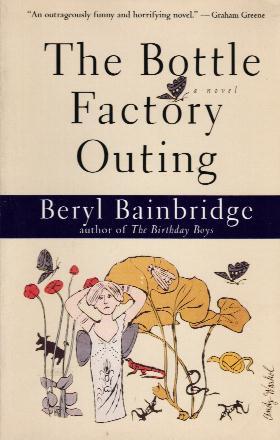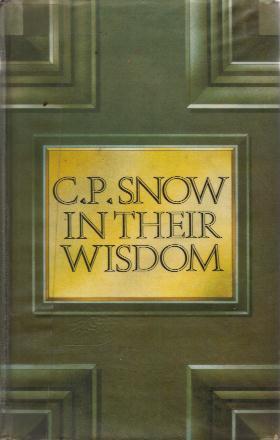
Nadine Gordimer
The following novels constitute the shortlist for the 1974 Booker Prize:
Notable Omissions from the 1974 Shortlist

|
The Conservationist Nadine Gordimer |
Dustjacket synopsis:
"Mehring is rich. He has all the privileges and possessions that South Africa has to offer,
but his possessions refuse to remain objects. His wife, son and mistress leave him: his foreman
and workers become increasingly indifferent to his stewardship; even the land rises up, as
drought, then flood, destroy his farm.
"Nadine Gordimer's fascinating portrait of a man both reckless and calculating, a 'conservationist' left only with the possibility of self-preservation, is also a subtle and detailed study of the forces and relationships that seethe in South Africa today."
Quotes:
"A triumph of style...it is not often that lyrical intelligence and political purpose are
combined in so effective a way" - Paul Theroux
"Gordimer has written what must be considered her masterpiece. The beauty and largeness
of this land she loves is drawn with a breadth and scope that is breathtaking." -
St. Louis Post-Dispatch
"This is a novel of immense power." - The New Statesman
First Paragraph:
Pale freckled eggs.
Swaying over the ruts to the gate of the third pasture, Sunday morning, the owner of the farm suddenly sees: a clutch of pale feeckled eggs set out before a half-circle of children. Some are sqautting: the one directly behind the eggs is cross-legged, like a vendor in a market. There is pride of ownership in that grin lifted shyly to the farmer's gaze. The eggs are arranged like marbles, the other children crowd round but you can tell they are not alowed to touch unless the cross-legged one gives permission. The bare soles, the backsides of the children have flattened a nest in the long dead grass of both eggs and children.
From the Penguin paperback edition, 1986.

|
Holiday Stanley Middleton |
Dustjacket synopsis:
"To escape the death of his son and the death-throes of his marriage, Edwin Fisher retreats -
to a place where he had once known the unqualified happiness of childhood. But as painful
memories rise unbidden and uncontrolled, Edwin must confront each in turn...and realise that
without a past there can be no future."
Quotes:
"We need Stanley Middleton to remind us what the novel is about. Holiday is vintage
Middleton. The result of Mr Middleton's analysis is so satisfying that one has to look
at nineteenth-century writing for comparable storytelling." - Ronald Blythe, Sunday Times
"He has never done anything better than Holiday" - Christopher Wordsworth, Guardian
"His creations remain in the memory long after the final page. Middleton is a miniaturist;
he devils away in umpromising, often drab suburban territory, missing nothing." - Ion Trewin, The Times
"Middleton observes, with a keen eye and ear, but then he goes on to search for the exactly
right words, his own words, that transform, while remaining true to, ordinary life." John Mellors, Listener
First Paragraph:
Light shimmered along the polished pews as the congregation heaved itself to its feet, hailing the Lord's Anointed. Grain arrows waved darkly in the wood under the coating of shellac, the brightness of elbow-grease. Brass umbrella-holders gleamed, but the metal rectangle to house the name of the pew's occupier had been allowed to blacken in disuse.
Edwin Fisher glanced at his hymn book as he listened to the voice of the woman next to him. 'He comes,' she sang, 'with succour speedy. And bid the weak be strong.' Her voice pierced, and she enunciated without inhibition so that a boy and girl two rows forward turned round to stare at her. Their mother gently handled them back to propriety.
Fisher hummed, not opening his mouth. The walls of the church stood white, thick, while the narrow, pointed windows were leaded into small diamonds of cleanish glass. Above his head the gallery stretched, supported on metal pilars in regency blue. Typically, he smiled to himself, the chaste colours of the late eighteenth, early nineteenth centuries applied, not without success, in this Victorian buidling intended for dark browns and country cream. The women next door lifted her head as sunshine caught the hair of the small boy who, now climbing on to his seat, leaned against his mother, tried to finger her hymn-book. 'Love, joy, hope, like flowers, Spring in His path to birth.'
From the Arena paperback edition, 1989.

|
Ending Up Kingsley Amis |
Dustjacket synopsis:
"In this sourly witty, wickedly enjoyable new novel, Kingsley Amis turns his withering eye on old age and extracts the
last drop of humour from the bizarre septuagenarian commune where the story is set. The denizens of Tuppenny-hapenny
Cottage leave us gasping: there's grotesque Adela, compulsively economical, who's seventy-one and never been kissed;
her brother, Brigadier Bernard Bastable, his habitual ill-humour aggravated by prolonged and painful sessions locked
in the lavatory and alleviated only by planning malicious practical jokes; Shorty the garrulous squaddie, linked to
Bernard by a fleeting affair in the military quarters thirty-five years before, whose daily addiction involves a trail of
bottles from behind the woodpile to on top of his wardrobe; George Zeyer, Emeritus Professor of Central European History,
reduced by a severe stroke to bedridden vegetating and nounless gibbering; and ghastly Marigold, Adela's only friend, with
her shagreen cigarette-holder and progressive amnesia, manically chirping her theatrical phrases.
"Round these characters Kingsley Amis has woven a painful farce, culminating in an excruciating Christmas, when the grandchldren arrive to do their duty, little expecting the riot of senile delinquency that is in store for them. Mr Amis has produced his most outrageous book. It is shameless and savage, and compelling to read."
First Paragraph:
'How's your leg this morning, Bernard?' asked Adela Bastable.
'Much as it was yesterday morning,' said her brother in his usual bantering tone. 'Or afternoon, for that matter. Sorry, but there it is.'
'Because it's quite a long way from this new place to the car-park. From the supermarket itself, I mean. You have to come out at the front, where you go in, and go all the way round to the back. You'd think they'd have an entrance or an exit at the back, wouldn't you?'
'Or even both. In a sense, yes, you would. Why not go to the old place?'
'I've explained all that to you I don't know how often,' said Adela in her thick voice, one that seemed to make it hard for her to express by its tone any emotion but a mild resentment. 'We're getting poorer the whole time because of inflation, so I have to keep trying new places to see that we get the best value for money. If you took the slightest interest in the affairs of the household you wouldn't have to be told that.'
From the Jonathan Cape hardback edition, 1974.

|
The Bottle Factory Outing Beryl Bainbridge |
Dustjacket synopsis:
"Beryl Bainbridge, critically acclaimed author of The Birthday Boys, will dazzle readers
with her offbeat, captivating voice in this haunting yet hilarious novel, soon to be made into a
motion picture.
"Freda and Bredna spend their days working in an Italian-run wine-bottling factory. A work outing offers promise for Freda, and terror for Brenda, passions run high on that chilly day of freedom, and life after the outing never returns to normal."
Quotes:
"An outrageously funny and horrifying novel" - Graham Greene
"A superb novel. It is taught in construction, expansive in charcaterization, vibrant in
atmosphere and profoundly comic" - The Times
"She makes utterly credible her grotesque and gruesome ending. That skill is rare, as is her
perfect ear for dialogue, her sharp comedy, and her atmospherics." - William Trevor, Guardian
"Such an atmospher of impending doom has not been created since Brighton Rock - except
that Beryl Bainbridge is mercilessly comic instead of mercilessly vicious. What originality,
what pleasure." - Sunday Times
First Paragraph:
The hearse stood outside the block of flats, waiting for the old lady. Freda was crying. There were some children and a dog running in and out of the line of bare black trees planted in the pavement.
'I don't know why you're crying,' said Brenda. 'You didn't know her.'
Four paid men in black, carrying the coffin on their shoulders, began to walk the length of the top landing. Below, on the first floor, a row of senior citizens in nighties and overcoats stood on their balconies ready to wave the old woman goodbye.
'I like it,' said Freda. 'It's so beautiful'.
From the Carroll & Graf paperback edition, 1994.

|
In Their Wisdom C.P. Snow |
Dustjacket synopsis:
"In their Wisdom is a moving, tough-minded, and curiously heartening elegy of our times.
"The story opens as the economic and industrial storm clouds grow darker and a decade of foul political weather is forecast for the nation. Three elderly peers, old friends if not political allies, and each a distinguished citizen in his own right, look wryly from the plush sidelines of the House of Lords at the looming crisis. It could mean the end of a certain way of life for all their countrymen; and each has the bitter knowledge that his life and work may have contributed not to a golden harvest but to a grim reckoning.
"Against this sombre (and disturbingly topical) background C.P. Snow tells the story of an epic struggle, in and out of court, over a disputed will. In Their Wisdom may well be compared to Dickens' Bleak House in the way that it transforms the majestic processes of the law into an image of a whole society.
"The catalyst is a vengeful millionaire. His intervention, for purely personal reasons, in the affair causes the stakes to rise immediately and almost vertically. What might have been a mildly scandalous minor suit - or even no suit at all - escalates into a battle with consequences and implications reaching deeply into the political and establishment life of the country. The love affairs of two women are intricately involved. The three peers are among those drawn into the fray, and the patterns of many relationships are changed, at first subtly and later sharply (a notable exception is the close friendship between the two leading and opposing QCs). The great law case with its built-in tensions, its measured time scale, and its eventual resolution, displays the plotting of a master.
"But although the protagonists are haunted by the precariousness of fortune, C.P. Snow gives us the sense of constant hope. The marvellously broad and onflowing narrative brings together, with grace and wisdom, a cast of finely drawn characters - women in love, climbers, successful men and losers - in a world where sadness and high living, poverty and extreme riches, old age and youth, all find dignity and a wider meaning."
First Paragraph:
Mr Skelding was doing what some men would have found more difficult. He was announcing, with an air of Adamic surprise, as though he alone among men had been granted this revelation, news which at least two of his audience knew as well as he did. And which revelation, since Mrs Underwood was to execute the will along with himself, he couldn't help knowing that they knew.
Still, there was well-being in some places round the room. Mrs Underwood listened without expression, sepia gaze concentrated on Mr Skelding, facial muscles firm, handsome, confident and commanding in her middle sixties, looking as though she should have been accompanied by a lady-in-waiting carrying her purse. Her son Julian was also well-preserved, seemed much less than forty, as he peered, light eyes wide open, enquiring, as though he too were startled by the Adamic surprise. But it was not from those two that well-being wafted back to Mr Skelding, echoing his own. Apart from the Underwoods there were six others whom Mr Skelding had asked to call on him that afternoon. Some were sitting on the window seats, others backed against the white painted panelling; the office was suitable for subdued legal interviews, not for a party this size. That, however, did not inhibit Mr Skelding. He enjoyed telling people that they were due to receive money they did not expect. He also enjoyed issuing warnings about obstacles in the jungly path before money could be taken as certain. For once, that afternoon the business was simple, his good nature was genuine and he could let it flow.
From the Macmillan hardback edition, 1974.
This page and its contents are copyright © 2002-06 by Perry Middlemiss, Melbourne, Victoria, Australia.
Last modified: December 1, 2006.